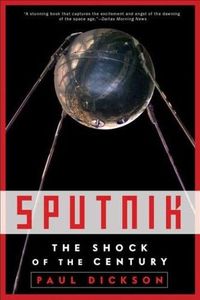

Purchase
The Shock of the Century
Walker & Company
June 2007
On Sale: May 29, 2007
320 pages
ISBN: 0802713653
EAN: 9780802713650
Hardcover
Add to Wish List
Non-Fiction
On October 4, 1957, as Leave It to Beaver premiered on
American television, the Soviet Union launched the space
age. Sputnik, all of 184 pounds with only a radio
transmitter inside its highly polished shell, became the
first man-made object in space; while it immediately shocked
the world, its long-term impact was even greater, for it
profoundly changed the shape of the twentieth century.
In his upcoming book, Washington journalist Paul Dickson
chronicles the dramatic events and developments leading up
to and emanating from Sputnik's launch. Supported by
groundbreaking, original research and many recently
declassified documents, Sputnik offers a fascinating profile
of the early American and Soviet space programs and a
strikingly revised picture of the politics and personalities
behind the facade of America's fledgling efforts to get into
space. Although Sputnik was unmanned, its story is intensely human.
Sputnik owed its success to many people, from the earlier
visionary, Konstantin Tsiolkovsky, whose theories were ahead
of their time, to the Soviet spokesmen strategically
positioned around the world on the day the satellite was
launched, who created one of the greatest public-relations
events of all time. Its chief designer, however—the
brilliant Sergei Korolev—remained a Soviet state secret
until after his death. Equally hidden from view was the political intrigue
dominating America's early space program, as the military
services jockeyed for control and identity in a peacetime
world. For years, former Nazi Wernher von Braun, who ran the
U.S. Army's missile program, lobbied incessantly that his
Rocket Team should be handed responsibility for the first
Earth-orbiting satellite. He was outraged that Sputnik beat
him and America into space. For his part, President
Eisenhower was secretly pleased that the Russians had
launched first, because by orbiting over the United States
Sputnik established the principle of "freedom of space" that
could justify the spy satellites he thought essential to
monitor Soviet missile buildup. As Dickson reveals,
Eisenhower was, in fact, much more a master of the Sputnik
crisis than he appeared to be at the time and in subsequent
accounts.
The U.S. public reaction to Sputnik was monumental. In a
single weekend, Americans were wrenched out of a mood of
national smugness and post-war material comfort. Initial
shock at and fear of the Soviets' intentions galvanized the
country and swiftly prompted innovative developments that
define our world today. Sputnik directly or indirectly
influenced nearly every aspect of American life, from the
demise of the suddenly superfluous tail fin and an immediate
shift towards science in the classroom to the arms race that
defined the cold war, the competition to reach the Moon, and
the birth of the Internet. By shedding new light on a pivotal era, Paul Dickson expands
our knowledge of the world we now inhabit, and reminds us
that the story of Sputnik goes far beyond technology and the
beginning of the space age, and that its implications are
still being felt today.
Comments
No comments posted.
Registered users may leave comments.
Log in or register now!
| 


 © 2003-2024 off-the-edge.net
all rights reserved Privacy Policy
© 2003-2024 off-the-edge.net
all rights reserved Privacy Policy